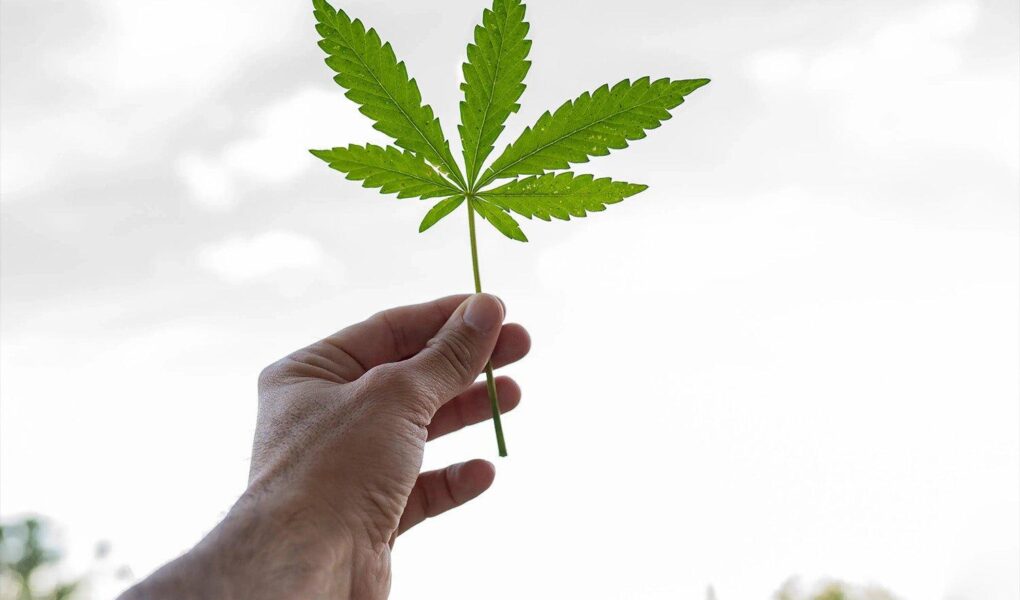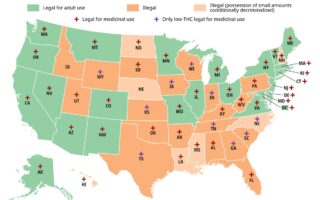As the sun sets on the landscape of traditional medicine, an age-old plant is stepping into the spotlight: marijuana. Once shrouded in stigma and debate, its myriad compounds are now being scrutinized for their potential health benefits, including the intriguing possibility of managing high blood pressure. With hypertension affecting millions worldwide, the quest for effective management solutions is more pressing than ever. As researchers delve into the unique properties of cannabinoids, questions arise: Can marijuana serve as a helpful ally in the fight against high blood pressure? Join us as we explore the current evidence, emerging studies, and the broader implications of this green herb in the realm of cardiovascular health.
Table of Contents
- Exploring the Connection Between Marijuana and Blood Pressure Regulation
- Understanding the Biological Mechanisms: How Cannabinoids Influence Cardiovascular Health
- Balancing Benefits and Risks: Evaluating Marijuanas Role in Hypertension Management
- Guidelines for Responsible Use: Navigating Cannabis Consumption for Blood Pressure Control
- Q&A
- In Summary
Exploring the Connection Between Marijuana and Blood Pressure Regulation
The relationship between marijuana and blood pressure regulation is complex and multifaceted. Research suggests that the cannabinoids found in marijuana, particularly THC and CBD, may have varying effects on blood pressure levels. Some studies have indicated that marijuana consumption could contribute to a temporary increase in heart rate and a subsequent decrease in blood pressure. This biphasic response suggests that the impact of marijuana on cardiovascular health could depend on several factors, including the dose, the method of consumption, and the individual’s specific health conditions.
It’s also essential to consider the potential risks and benefits of using marijuana for blood pressure management. While some patients report relief from anxiety and stress, which can lead to improvements in overall cardiovascular health, the psychoactive effects of THC may not suit everyone. Here are some points to ponder:
- Patient Variability: Individual responses to marijuana can differ significantly.
- Dose Dependence: Low doses may have calming effects, whereas high doses might provoke anxiety.
- Long-Term Effects: More long-term studies are needed to understand the implications of chronic use.
Although emerging data provides insights, extensive research is still required to uncover the precise role marijuana plays in blood pressure regulation. A collaborative approach between healthcare providers and patients is crucial for navigating this potential treatment option safely.
Understanding the Biological Mechanisms: How Cannabinoids Influence Cardiovascular Health
At the heart of understanding how cannabinoids such as CBD and THC may impact cardiovascular health lies the endocannabinoid system (ECS). This complex system is composed of cannabinoid receptors, endocannabinoids, and enzymes that work together to maintain physiological balance. CB1 and CB2 receptors are the main players that cannabinoids interact with, with CB1 primarily found in the brain and CB2 in the immune system. When cannabinoids bind to these receptors, they can influence various cardiovascular functions, such as heart rate, vascular tone, and blood pressure. For instance, activation of CB1 receptors has been linked to vasodilation, the widening of blood vessels, which can lead to a decrease in blood pressure. However, this effect can vary significantly depending on the dosage and type of cannabinoid used.
Moreover, cannabinoids may promote cardiovascular health through their anti-inflammatory and antioxidant properties. Studies suggest that cannabinoids may reduce inflammation within the vascular system, potentially protecting against arteriosclerosis and other cardiovascular diseases. Key benefits include:
- Improved endothelial function: Cannabinoids might enhance the performance of blood vessel linings.
- Reduced oxidative stress: By combating free radicals, cannabinoids may protect blood vessels from damage.
- Lowered heart rate: Some evidence points to cannabinoids reducing heart rate under certain conditions, which could be beneficial for those with hypertension.
However, it’s essential to recognize that while these potential benefits are promising, the relationship between cannabis use and cardiovascular health is still being explored. Further research is needed to establish clear guidelines on safe use and possible effects on blood pressure regulation.
Balancing Benefits and Risks: Evaluating Marijuanas Role in Hypertension Management
As research into the relationship between cannabis and hypertension continues to evolve, understanding the potential benefits and risks associated with marijuana use in blood pressure management is essential. Some studies suggest that components of marijuana, such as CBD, may promote vasodilation and improve blood flow, potentially leading to lower blood pressure. Additionally, the anxiolytic properties of cannabis could help reduce stress and anxiety, factors often linked to elevated blood pressure levels. The following points highlight some of the advantages that users might consider:
- Relaxation: Cannabis may induce a state of calm, which can help lower heart rate and blood pressure.
- Reduced Inflammation: CBD’s anti-inflammatory effects could lead to overall cardiovascular health improvements.
- Improved Sleep Quality: Better rest may contribute to better blood pressure regulation.
However, it is equally important to remain vigilant about the associated risks. Some research indicates that acute use of THC can actually lead to temporary spikes in blood pressure and heart rate, particularly among inexperienced users or those prone to hypertension. Furthermore, the psychoactive effects of marijuana can impair cognitive function and coordination, which poses additional risks, especially for individuals managing other health conditions. Below are some concerns to consider:
- Potential for Addiction: Habitual use may lead to dependency in some individuals.
- Legal and Regulatory Issues: Varies significantly by location, impacting accessibility and use.
- Constituent Variability: Different strains and concentrations may yield unpredictable effects.
| Aspect | Benefits | Risks |
|---|---|---|
| Blood Pressure Control | May promote relaxation | Possible temporary increases |
| Cognitive Impact | Can enhance mood | May impair decision making |
| Sleep Quality | Improves sleep | Interference with REM sleep |
Guidelines for Responsible Use: Navigating Cannabis Consumption for Blood Pressure Control
When considering the use of cannabis for managing blood pressure, it’s vital to approach consumption mindfully and responsibly. Individuals should think about starting with low doses to assess their personal reactions, as cannabis can affect each person differently. Monitoring your blood pressure regularly while experimenting with cannabis can provide insights into how your body is responding. Additionally, consulting with healthcare professionals before incorporating cannabis into your routine can help ensure that it aligns with your overall health strategy.
Here are some practical tips for responsible cannabis consumption:
- Know Your Strains: Different cannabis strains have varying effects. Indicas may promote relaxation, while sativas might induce energy. Understanding these differences can assist in selecting the right strain for your needs.
- Opt for Low-THC Products: Products lower in THC may reduce the risk of adverse reactions, making them a safer option for those concerned about blood pressure fluctuations.
- Stay Hydrated: Cannabis can lead to dehydration, which could negatively impact blood pressure. Make sure to drink enough water.
- Consider Methods of Consumption: Inhalation, edibles, and tinctures can have different onset times and durations. Choose a method that fits your lifestyle and medical needs.
To further guide your consumption choices, consider the following effects of various cannabinoids:
| Cannabinoid | Potential Effect on Blood Pressure |
|---|---|
| THC | May induce temporary increases in heart rate and blood pressure |
| CBD | May promote relaxation and stabilize blood pressure levels |
Q&A
Q: What is the relationship between marijuana and high blood pressure?
A: The relationship between marijuana and high blood pressure (hypertension) is complex and still being researched. Some studies suggest that certain compounds in marijuana, primarily cannabidiol (CBD), may help lower blood pressure by promoting relaxation and reducing anxiety. However, other components, particularly tetrahydrocannabinol (THC), may have the opposite effect, potentially increasing heart rate and blood pressure in some individuals.
Q: Can marijuana directly treat high blood pressure?
A: Currently, there is no conclusive evidence to support marijuana as a direct treatment for high blood pressure. While some anecdotal reports suggest that it can help manage stress and anxiety—which may indirectly benefit blood pressure—medical professionals typically recommend more established treatments. Always consult with a healthcare provider regarding treatment options for hypertension.
Q: Are there particular strains of marijuana that could be more beneficial for blood pressure?
A: Strains of marijuana vary in their chemical composition of cannabinoids and terpenes, each potentially affecting the body in different ways. Strains that are higher in CBD and lower in THC are often suggested for those concerned about blood pressure since CBD is associated with calming effects. However, individual reactions can differ widely, and what works for one person may not work for another.
Q: What do health professionals think about using marijuana for hypertension?
A: Health professionals are generally cautious about recommending marijuana as a treatment for high blood pressure. Many emphasize that more research is needed to understand its long-term effects and interactions, especially considering that marijuana can affect cardiovascular health in unpredictable ways. Most doctors encourage patients to rely on evidence-based treatments while considering lifestyle changes like diet and exercise.
Q: Are there any potential risks associated with using marijuana for high blood pressure?
A: Yes, there are potential risks. Marijuana can lead to increased heart rate and may cause dizziness or lightheadedness—symptoms that can be particularly concerning for someone with hypertension. Additionally, some individuals may experience side effects that counteract any potential benefits, such as anxiety or paranoia. It’s essential to approach marijuana use with caution and under the guidance of a healthcare professional.
Q: What alternative approaches are available for managing high blood pressure?
A: There are several evidence-based approaches to managing high blood pressure, including medication, dietary changes (like reducing sodium intake), regular physical activity, stress management techniques (such as yoga or meditation), and avoiding tobacco and excessive alcohol consumption. Always consult your doctor for a tailored plan that suits your individual health needs.
Q: Is it safe to combine marijuana with prescribed blood pressure medications?
A: Combining marijuana with prescribed medications can be potentially risky and should always be discussed with a healthcare provider. Marijuana may interact with medications, altering their effectiveness or increasing side effects. A doctor can offer guidance based on your specific health profile and medication regimen.
Q: What’s the bottom line for someone considering marijuana for high blood pressure?
A: The bottom line is that while marijuana may have some potential benefits for relaxation and anxiety reduction—factors that can contribute to high blood pressure—it is not a substitute for clinically proven treatments. If you’re considering using marijuana, it’s crucial to have an informed discussion with your healthcare provider to weigh the risks and benefits and ensure it fits into your overall health strategy.
In Summary
As we wrap up our exploration into the relationship between marijuana and high blood pressure, it’s clear that this topic is anything but straightforward. While some studies hint at potential benefits, others raise important questions about the complexities of individual health and the myriad factors influencing blood pressure levels.
As research continues to evolve, it’s essential for those considering marijuana as a treatment to consult with healthcare professionals and weigh the potential risks and rewards. The journey to managing high blood pressure remains a personal one, and what works for one individual may not work for another.
Ultimately, whether you’re a seasoned user or merely curious, staying informed and cautious is key. As our understanding of cannabis deepens, so too does the conversation around its role in our health. So, let’s approach this ever-changing landscape with an open mind and a commitment to responsible choices, paving the way for a future where knowledge truly guides our paths to wellness.



